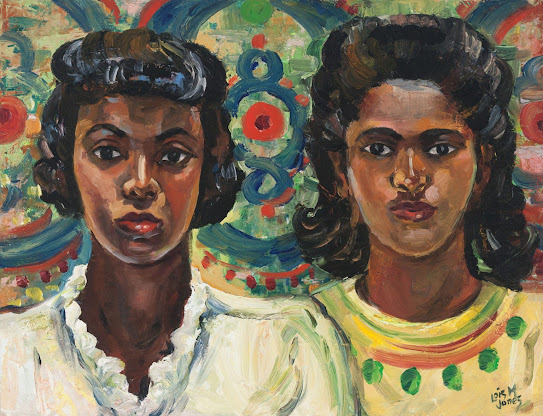Sethe, Beloved, and Grief
Throughout Beloved, important information is kept
ambiguous to the reader until methodically revealed, gradually creating a full
picture of each of the characters’ lives and experiences (at least ones
important to the story)—that is, except for in the case of Beloved. Beloved’s
reemergence into the world and her final departure are both largely left to the
imagination of the reader. So is the meaning of Beloved’s reappearance in Sethe’s
and Denver’s lives, which is the subject of this blog post. I certainly don’t
think that there is a single definitive reason for Beloved’s return, but wondering
about possible purposes of her character lead me to think about the relation
between Beloved and Sethe’s grief for her.
Sethe acts completely unapologetic about killing Beloved in order to save her from going back to Sweet Home. Even when faced with her neighbors’ rejection and Paul D’s harsh disapproval, she stands her ground, saying she did what was best for her kids. Additionally, while we can tell that Sethe deeply loved Beloved (thus her name), we are not really given the impression that Sethe takes the time to grieve her. Even if Sethe truly believes that killing Beloved is best, that doesn’t mean Sethe isn’t heartbroken by her death. And from the way she becomes obsessed with Beloved later in the novel, desperately wanting to be close to her daughter again, it seems that Sethe is heartbroken—she just swallows this grief. Sethe’s response to Beloved’s death makes sense for her character, as she is described as having an “iron wall” and is just a woman who deals with things. Additionally, though Beloved’s death and the events surrounding it are extremely traumatic experiences, Sethe does not necessarily acknowledge them as such. This could be because these experiences are too painful for her to fully process, or perhaps because Sethe, in her adamancy that her decision to kill her kids was correct, felt as though (consciously or unconsciously) grief would have contradicted this sentiment.
Beloved’s presence in the house as a ghost feels representative of
Sethe’s lingering unprocessed grief. Beloved is always present in the house and
in Sethe’s consciousness, but she is never something tangible to be confronted,
just as Sethe does not confront her grief for her. Then, when Beloved literally
walks back into Sethe’s life, Sethe is forced to confront how much she loves
Beloved and wants to be with her. Though Sethe does not cope with these
feelings in a healthy way, and her love for Beloved becomes a dangerous
obsession, she is still actually experiencing her feelings toward
Beloved rather than burying them. It isn’t until Beloved leaves their lives for
good that Sethe experiences the grieving process she didn’t go through before,
and then, with help, is able to move past Beloved and forget about her for
good, casting off the weight in 124 and on her shoulders that she had felt all
those years after Beloved’s death.



I never really thought about what Beloved was up to before returning back from the dead. I think her role is to help Sethe process her grief, as you expressed, and I think it was timed for when Paul D would come, because Paul D confronting Sethe is likely something Sethe needed to start processing her grief, and Beloved could help Sethe make sense of it after she got that push. (Which is why Sethe only recognized Beloved as her baby after Paul D left). It worked, as I don't belive that Sethe was ever truly happy until she realized the truth about Beloved. Great post!
ReplyDeleteThis comment has been removed by the author.
ReplyDeleteBeloved is such a strange and interesting character and I'm really glad that you wrote about her. Like you say, the mystery that surrounds her backstory is part of what makes her so effective in the novel. In some ways she isn't really a character at all because of the ways that she exists to alter Sethe's life rather than to live her own. Beloved comes back to break down Sethe's iron wall, and once she does it she has to leave, but Beloved doesn't really exist for herself ever.
ReplyDeleteThis analysis makes a lot of sense to me. Sethe is so focused on the blowback from the community judging her actions that she remains in defensive mode, defending what she did as the only way to keep her children "safe." But as you note, because she's been so committed to defending her actions, she's not been able to grieve the horrific loss and the general trauma of the event. Even if she is beyond reproach, morally, and we totally "understand" why she did what she did, it's still an unimaginably horrific event to endure. The loss of a child is always a complex and far-reaching trauma--how much more so for Sethe, to lose her child in this way, after all she's gone through, after only 28 days of "freedom"?
ReplyDeleteIncisive commentary on Sethe struggling to confront her grief. It's ironic that one of the first descriptions of Sethe was that she never looked away from even the harshest things. You did mention the "iron wall" but I thought I'd add this too. It directly contrasts the long, long struggle to come to terms with her traumatic past.
ReplyDeleteGreat post! I think it's definitely true that Sethe's act of murdering her children was something she felt like she was forced to do. Obviously, she didn't want to, but she had to in order to keep them safe. And I think this is all part of Sethe's trauma overall. Her actions were extremely harsh, but in a more general sense, many Black people often have to make decisions that they feel is best no matter how painful it is. In this way, Morrison does a good job of explicating this perspective.
ReplyDeleteI definitely considered that Beloved's appearance had a lot to do with Sethe's grief while reading, and you post outlined that idea really well. Nice job! I think that the fact that Beloved is both obsessed with Sethe and also later spiteful and takes over represents Sethe's own internal struggle with her decision. If Beloved still loved her, that would mean Sethe made the right decision; if she didn't, that would mean Sethe did not. And if Beloved in some way comes from Sethe's mind, the fact that Beloved is both at different times shows that Sethe still isn't sure. At the same time she can't explicitly admit to herself she isn't sure - that would make her face painful feelings she hasn't fully processed.
ReplyDeleteI think this is a really interesting point! Throughout the novel I was rather perplexed by Beloved's contradictory actions and ambiguous motives, but viewing them as a reflection of Sethe's mixed feelings about her own actions makes a lot of sense to me.
DeleteI love the way you put this-- I was thinking very similarly but I had trouble articulating it. One thing you pointed out that I loved was how Sethe never really mourned Beloved. It makes so much sense why she feels the remorse/guilt that she does, seeing as she never processed it. So many of the things that happen in this novel are because of the lack of processing, and the pent up emotions. I think that's what makes it so confusing yet so intriguing.
ReplyDelete